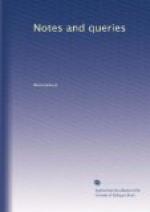Querela Cantabrigiensis (Vol. ii, p. 168.).—Dr. Peter Barwick, in the life of his brother, Dr. Jno. Barwick (Eng. Edit. Lond. 1724, 8vo.), after describing the treatment of the University by Cromwell, adds (p. 32.) “But Mr. Barwick, no inconsiderable part of this tragedy, together with others of the University, groaning under the same yoke of tyranny, and each taking a particular account of the sufferings of his own college, gave a distinct narrative of all these barbarities, and under the title of Querela Cantabrigiensis, or the University of Cambridge’s Complaint, got it printed by the care of Mr. R—— B——, bookseller of London who did great service to his King and country, by printing, and dispersing in the most difficult times, books written in defence of the royal cause.” See also Biog. Brit., article “Barwick”.
John I. Dredge.
Ben Johnson (Vol. ii., p. 167.)—So the name was spelt by most of his contemporaries. The poem mentioned by N.A.B. is printed in the Underwoods, Gifford’s edition, ix., 68; but the MS. may contain variations worthy of notice. I should doubt its being autograph, not merely because the poet spelt his name without the h, but because the verses in question are only part of his Eupheme.
J.O. Halliwell.
Barclay’s “Argenis".—Since I sent you a Query on this subject, I have heard of one translation, by Miss Clara Reeve, the authoress of The Old English Baron and other works. She commenced her literary career, I believe, by a translation of this work, which she published in 1772, under the title of The Phoenix.
Jarltzberg.
Hockey (Vol. i., p. 457.).—I have not observed that this has been yet noticed: if such be the case, permit me to refer to a letter of the poet Cowper, dated 5th Nov., 1785 (5th vol. Works, edit. by Southey, p. 174.) in which, alluding to that day, he says,
“The boys at Olney have likewise a very entertaining sport which commences annually upon this day; they call it hockey, and it consists in dashing each other with mud, and the windows also, so that I am forced to rise now and then and to threaten them with a horsewhip, to preserve our own.”
F.R.A.
Praed’s Poetical Works (Vol. ii., p. 190.).—Your Cambridge correspondent, Mr. Cooper, will be glad to know that Praed’s poems are published in a collected form; Poetical Works of Winthrop Mackworth Praed, now first collected by Rufus W. Griswold; New York, 1844. This collection contains some thirty-six pieces. The longest poems, “Lillian” and “The Troubadour,” each in two cantos, display passages of great beauty and exquisite musical flow. Among the charades, five in number, “Sir Harry, he charged at Agincourt”, is not to be found.
W.M. Kingsmill.
* * * * * {239}




